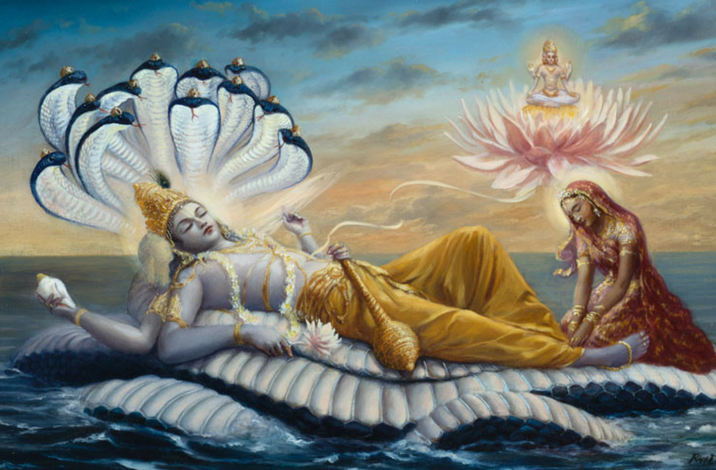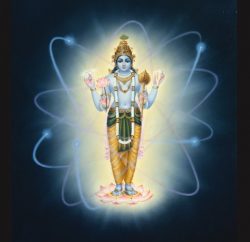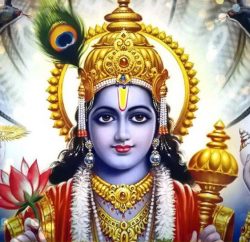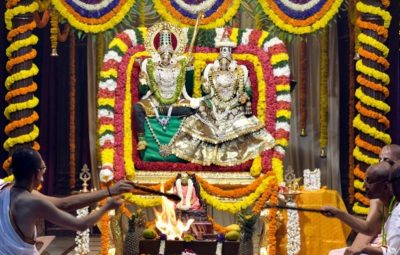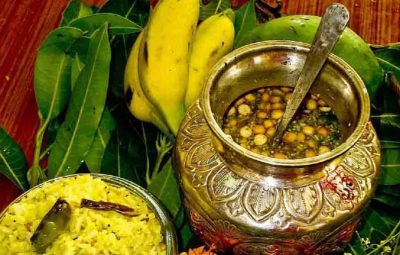Sri Yudhisthira Maharaja said, “Oh Supreme Lord, what is the name of that Ekadashi that occurs during the dark fortnight (krishna paksha) of the extra, leap-year month of Purushottama. What is the process for observing it properly? Kindly narrate all of this to me?”
Lord Krishna, replied,
“Oh Yudhisthira, this meritorious day is called Parama Ekadashi. It bestows the great benediction of an enjoyable life and release from birth and death. The process for observing it is similar to that for observing the Ekadashi that occurs during the light part of this month of Karttika. I will now tell you a wonderful story, I heard from the great sage in the city of Kampilya.
Once a pious brahmin named Sumedha resided in Kampilya with his wife, Pavitra, who was devoted to her husband. On account of having committed some sin in his previous life, Sumedha was without any money and he hardly had adequate food, clothing, or shelter. His wife continued to serve Sumedha faithfully despite their poverty. When guests would come she would give them her own food.
Sumedha one day said to Pavitra, ‘I beg alms from the rich but receive hardly anything. Therefore please permit me to go abroad and attain some wealth.‘
Pavitra replied to him with great respect and affection: ‘One who, though in misery, is interested in the welfare of others speaks just as you have. However, the scriptures state that whatever wealth a person attains in his life is due to his having given charity in previous lives and that if one has not given charity, then even though he may sit atop a mound of gold, he will still remain poor. Please, therefore, stay with me and be satisfied with whatever wealth we get.’
Hearing this, Sumedha decided to stay back. One day the great sage Kaundinya arrived at their place, and upon seeing him, Sumedha and his wife offered him their obeisances. ‘‘Just by having your darshan today,’ said Sumedha, ‘I have become very fortunate.’ They fed the sage as they could afford, and afterwards, Pavitra asked the sage, ‘Oh most learned one, what process can we follow to be relieved of our poverty?’
Kaundinya reflected for a moment and then said, ‘There is a fast day very dear to Lord Hari. Fasting on this day nullifies all kinds of sins and removes all miseries caused by poverty. This fast day, which occurs during the dark part (Krishna paksha) of the extra, leap-year month, is known as Parama Ekadashi. It is the topmost day of Lord Vishnu, hence the name Parama.
This holy fast was once observed faithfully by Lord Kuvera. When Lord Shiva saw how strictly he had fasted, he became very pleased and made Kuvera the treasurer of heaven. Also, king Harishchandra fasted on this Ekadashi after his dear wife and son had been sold, and the king was able to get them back. Therefore, you also should observe the sacred fast of Parama Ekadashi.’
Then he said to Sumedha,
‘On the Dvadashi, the day after Ekadashi, you should vow to observe Pancharatrika fasting according to all the rules and regulations. After taking a bath early in the morning, you and your wife, along with both your parents and hers, should fast for five days according to your ability. Then you will all become eligible to return home, to the abode of Lord Vishnu.’
Hearing this advice, Sumedha and Pavitra, observed the Parama Ekadashi and the fast of Pancharatrika, and thereafter they saw a handsome prince approaching them from the royal palace. He gave them a beautiful house and an entire village for their livelihood.
Oh Yudhisthira, one who fasts on this day has also completed the offerings of oblations to his forefathers in Gaya. He has, in effect, fasted on all other auspicious days.’
The Pancharatrika fast – the fast of five days (pancha = five, ratri = nights) in the extra, leap year month – is said to remove all kinds of abominable sins. But the Pancharatrika fast, together with the fasts of Parama and Padmini Ekadashi, destroys all of a person’s sins. If a person is unable to fast on these days, he should observe the fasts during the extra month according to his ability. The rare human birth is meant for accumulating merit and at last achieving liberating release from this material world.
King Yudhisthira did exactly as Lord Krishna had instructed, and so did all his brothers and their wife. Whoever, after taking a proper bath, observes a fast on these two extra-month Ekadashis will go to heaven. Thus ends the narration of the glories of Parama Ekadashi from the Skanda Purana.


